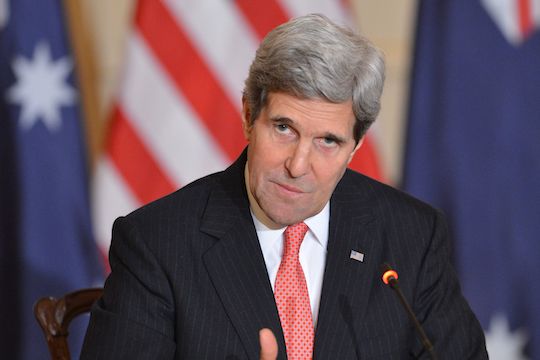Kerry’s team has been so sensitive to Netanyahu’s political needs that it kept handing the Israeli prime minister political achievements without getting anything in return. This dynamic has been put on hold now, and Kerry should probably thank Abbas for that.
A sense of chaos has engulfed the diplomatic process after the Palestinians decided to submit a formal request to join 15 international treaties and conventions, among them the Fourth Geneva Convention. (See the full list below.)
When the talks resumed last summer, the Palestinians agreed to refrain from joining international institutions, and Israel was to release 104 prisoners who had already been jailed for more than 20 years. But Israel decided not to release the fourth and final group of prisoners unless the Palestinians agreed to prolong the negotiations at least until 2015. Earlier Tuesday, Israel also announced the construction of hundreds of new housing units in the annexed parts of Jerusalem, beyond the Green Line.
While officially the talks didn’t break, it is not clear whether they will be resumed, or under what conditions. Secretary of State John Kerry canceled his planned trip to the region – he was supposed to meet with Mahmoud Abbas today – and is slowly distancing himself from the peace process, repeating that progress “depends on the parties.” The pressure on the administration to do something will probably increase in the coming days, but there is also a growing reluctance, especially in the White House, to spend more political capital on a an effort that is not likely to go anywhere.
Read +972’s full coverage of the peace process
Staying away might actually be the best move Kerry takes. So far, his strategy was to negotiate something with the Israelis, then to pressure the Palestinians to accept what was agreed upon with Netanyahu. This is how he (reportedly) came up with a framework for a final status agreement that would include Palestinian recognition of Israel as a Jewish state and a prolonged Israeli presence in the Jordan Valley, but not much about pre-1967 borders or the status of Jerusalem.
The same logic led to what was reported as an impending deal that would enable the talks to continue: Israel would release the prisoners as planned, later adding 400 “light offenders” and “humanitarian cases”; it was also supposed to refrain from new settlement construction in certain areas. In return, the talks would be extended until 2015, the pressure on Netanyahu would be relieved, and he would get a special bonus – the release of Israeli spy Jonathan Pollard, who has served almost 30 years of a life sentence in U.S. federal prison.
But the idea of letting Pollard go just to save a meaningless process looked so desperate, that it led to wall-to-wall criticism of the Obama administration in Washington. In that sense, Abbas probably saved Kerry and Obama from a serious embarrassment at home. The American team was so sensitive to Netanyahu’s political needs throughout the process that it kept handing the Israeli prime minister political achievements without getting anything in return. This dynamic was put on hold, and Kerry should probably thank Abbas for that, too.
Now the ball is in Israel’s court. Netanyahu will need to decide whether he really wants these talks. He can withdraw and blame the Palestinians (in fact, he will keep blaming them for everything anyway) but there is a cost attached to such a decision – pressure on the more centrists elements in his coalition, and more punitive measures from the international community down the road. He could also turn to the administration for help in trying to save the talks, but there will be a cost to that, too, both internally and within the process. If Kerry and Obama stay away for a while, there might be a small moment of truth for Bibi – the kind of which he has been trying to avoid all along.
***
The full list of treaties and conventions to which Abbas sent letters of accession:
1. The Four Geneva Conventions of 12 August 1949 and the First Additional Protocol
2. The Vienna Convention on Diplomatic Relations
3. The Vienna Convention on Consular Relations
4. The Convention on the Rights of the Child and the Optional Protocol to the Convention on the Rights of the Child on the Involvement of Children in armed conflict
5. The Convention on the Elimination of All Forms of Discrimination against Women
6. The Hague Convention (IV) respecting the Laws and Customs of War on Land and its annex: Regulations Concerning the Laws and Customs of War on Land
7. The Convention on the Rights of Persons with Disabilities
8. The Vienna Convention on the Law of Treaties
9. The International Convention on the Elimination of All Forms of Racial Discrimination
10. The Convention against Torture and Other Cruel, Inhuman or Degrading Treatment or Punishment
11. The United Nations Convention against Corruption
12. The Convention on the Prevention and Punishment of the Crime of Genocide
13. The International Convention on the Suppression and Punishment of the Crime of Apartheid
14. The International Covenant on Civil and Political Rights
15. The International Covenant on Economic, Social and Cultural Rights
Related:
The peace process is dead, long live the peace process
What ‘painful concessions’ are left for Palestinians to make?
Israel is reneging on its promise to release Palestinian prisoners



